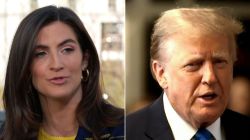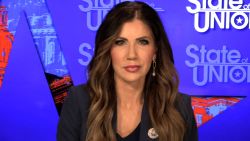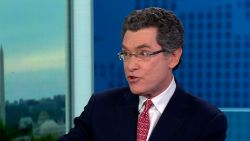Editor’s Note: Samantha Vinograd is a CNN national security analyst. She served on President Obama’s National Security Council from 2009-2013 and at the Treasury Department under President George W. Bush. Follow her @sam_vinograd. The views expressed in this commentary are her own. View more opinion articles on CNN.
Presidential calls can be an opportunity to advance US national security interests. A failure to communicate these interests with foreign leaders – especially hostile ones – can increase the chances for misunderstanding and miscalculation.

That’s why painstaking preparation usually goes into each presidential call, and the subsequent call readout. The national security team wants to make sure the president uses every second of phone time to advance US interests. Call sheets often include proactive issues for the president to raise, a summary of topics a foreign counterpart will likely mention that the president should watch out for, and a clear sense of what the ultimate goal of the contact is.
Undermining US national security is not typically on the president’s to-do list for such calls.
And yet, on Friday, President Trump spoke to Russian President Vladimir Putin about special counsel Robert Mueller’s report, and failed to warn Putin about meddling in the upcoming 2020 elections – all before he publicly summarized the conversation with false and divisive language.
Contradicting the US intelligence community on Russian election interference by calling the Mueller investigation a “Russian hoax” was just the tip of the iceberg. Trump also said Russia isn’t “looking at all to get involved” in Venezuela, just two days after Secretary of State Mike Pompeo called the Russian foreign minister to warn that Putin’s interference there was “destabilizing.”
This is just the latest example that shows Trump relies on a shadow cabinet of US enemies to advise him rather than his own national security council.
Damage control following the President’s hour-long call with Putin and preventive measures for the future are necessary. In the absence of being able to rescind the President’s phone privileges entirely, limiting his phone time is the safest thing his team can do at this juncture.
Practice makes perfect
If the President had prepared for the call with members of his national security team and actually listened to them, they would have likely advised that he raise election security in light of Russia’s ongoing attack on our democracy. Despite the US intelligence community’s repeated warnings, Trump has often minimized the scale and scope of Russia’s 2016 attacks.
Spending about 90 minutes on the phone with Putin without mention of the strategic threat Russia poses to the United States is not something any credible US national security official would advise.
Trump’s failure to confront Putin signals that the Russian leader can continue this illegal activity at minimal cost. Given this response, we should assume that past Russian election attacks were just practice – if President Trump didn’t raise the issue, let alone the costs of attacking us, he’s simply opening the door for Putin to continue his illegal behavior.
Joke’s on you, Mr. President
To make matters worse, the President managed to aid and abet Russia in his own official readout of the phone date.
After the call, Trump initially tweeted, “Had a long and very good conversation with President Putin of Russia. As I have always said, long before the Witch Hunt started, getting along with Russia, China, and everyone is a good thing, not a bad thing. We discussed Trade, Venezuela, Ukraine, North Korea, Nuclear Arms Control and even the ‘Russian Hoax.’ Very productive talk!”
By referring to the special counsel’s investigation as a “hoax,” Trump signaled that he’s more concerned with his own insecurities about the Mueller investigation than he is with holding Putin accountable for the attack that was the basis for launching the investigation in the first place.
Trump also shared that Putin, in describing the Mueller investigation, “said something to the effect that it started up as a mountain and ended up as a mouse. But he knew that because he knew that there was no collusion. Pretty much that’s what it was.”
Of course Putin was eager to minimize the impact – he launched the attack and knows its size and scale better than anyone. But he also predictably wanted to discuss the Mueller investigation with Trump because he knows it is one of Trump’s triggers, not to mention a divisive issue (one that Russia can manipulate).
Putin is intent on manipulating the President and making Trump look weak and malleable. He succeeded in doing so Friday. Prepping for this call and trusting his own team could have helped the President avoid falling for such an obvious trap.
Kremlin approved
It would be easy to confuse the President’s call readout for one that the Kremlin drafted – it hits all the right notes, for Putin. Under normal circumstances, a call readout is vetted by the President’s experts so it accurately captures what was discussed while ensuring the official summary doesn’t unintentionally undermine US national security interests.
In this case, it appears Trump bypassed his own team and anointed himself national security adviser, White House press secretary, Russia expert and more.
As if his initial readout wasn’t damaging enough, Trump followed up with a second tweet Saturday morning using divisive rhetoric. This only furthers Russia’s goal of sowing division and spreading misinformation. It’s important to note we’ve sanctioned Russians for partaking in this kind of information warfare.
Presidential call readouts have different audiences – the general public, the media and our foreign counterparts – whether it’s the leader who took part in the call, or the citizens of that country. These summaries can communicate strength and resolve or, in this case, show how weak a president is.
Trading with the enemy
The President also said he discussed trade with Putin – another worrying issue given the sanctions we have in place because of Russia’s illegal invasion of Crimea, use of nerve agent in the United Kingdom, election interference and other destabilizing activities around the world.
It’s likely Putin asked for sanctions to be lifted – it’s his standard operating procedure. Knowing his target and how much the President likes to talk up trade deals, it’s likely Putin pointed out the prospects for increased bilateral trade or perhaps even floated the possibility of lower energy prices if Trump lifted Russia sanctions.
But sanctions have historically been lifted when illegal behavior has stopped. We’ve seen no signs of that from Russia, which has only increased its illegal activity under the Trump administration. Bilateral trade issues should be on the table only after Russia adheres to international law – not before. But Putin knows how to play to Trump’s temper and his desire to tout increased trade, no matter what the national security costs are.
Trump’s lengthy conversation with Putin and his subsequent call readouts indicate that the President ignores his home team in favor of a dynamic duo of his own “hunches” and whatever his shadow national security adviser – President Putin – tells him. Trump has failed to acknowledge the Russian threat given Putin’s ultimate goal is to undermine the United States. Instead, Trump has only proven to be putty in Putin’s hands and the best thing the President’s national security team can do is to limit his phone time at all costs.
There is a Russian hoax, but it’s not what the President thinks. It involves Putin laughing at – not with – Trump.





















